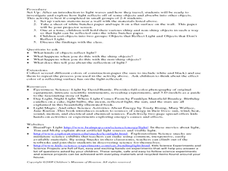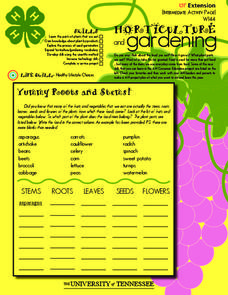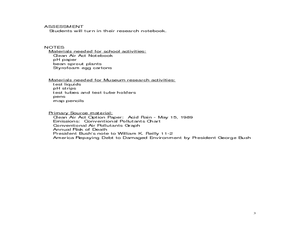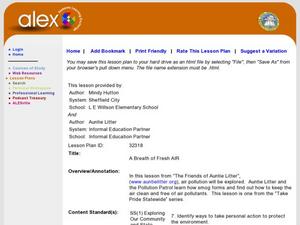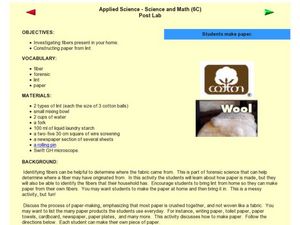Curated OER
Sour and Bitter: Acids and Bases
Tenth graders distinguish between acids and bases. In this pH lesson, 10th graders view a PowerPoint and discuss the characteristics of an acid and a base. They investigate natural substances to determine the pH level of each.
Cornell University
Nano What?
The size of a nanoparticle is difficult for pupils to grasp. A hands-on experiment is designed to give your classes perspective. Learners analyze different sports drinks for the content of electrolytes as an introduction to nanoscale....
Curated OER
The Process of Art Criticism
Students interpret possible meanings of works of art by analyzing how specific works are created and how they relate to historical and cultural contexts
Curated OER
The Root Show
Students investigate plant roots. In this plant lesson, students discover the function and structure of plant roots. Students plant a plant in a milk carton with a clear section cut out in order to observe the roots of the plant.
Curated OER
Lab Safety
For this lab safety worksheet, students use an illustration of students in a lab classroom to complete 10 short answer questions about what they see as safe and unsafe lab procedures.
Curated OER
Energy and Work: Transformation through Engines
Students are introduced to the concept of thermodynamics. In groups, they participate in experiments in which they discover how potential energy converts into kinetic energy. They use the internet to research the components of a...
Curated OER
Shake, Rattle and Roll
Sixth graders explore the causes and effects of earthquakes. They also collect and analyze data in graphs. They also use the Internet to research earthquakes
Curated OER
Light Reflections
Students explore light. For this physical science light lesson, students display objects on a projection screen and investigate how light absorbs, refracts, transmits and reflects. Students discuss common features of light based on...
Curated OER
Collect Data Using a Transect Line
Learners learn about transect lines through a study of marine debris. For this marine debris lesson, students calculate the items on a transect line and graph them. Learners complete a category worksheet.
Curated OER
Horticulture and Gardening
In this colorful packet, students engage in a variety of activities involving plants and seeds. After answering the 50 questions in the packet, learners can go on to delve into their own projects.
Curated OER
4-H Horticulture and Gardening- Intermediate Learner's Page
In this 4-H horticulture and gardening activity, middle schoolers study how some of the food they eat is the stems, roots, leaves, seeds, and flowers of plants by completing a fill-in-the-blank activity and a word search page. They...
Curated OER
Identifying Variables
In this variables learning exercise, high schoolers are given seven experiments that they read and identify the independent variable, dependent variable, control group and standardizing variable.
Curated OER
Plant and Animal Cells
Students investigate parts of a cell. In this plant cell lesson, students determine the difference between plant and animal cells. Students discover that coral is an animal based on cell characteristics. Students create puppets to...
Cornell University
Shedding a "Little" Light on Cancer Surgery
Many types of cancer treatments now depend on nanotechnology—a big "little" discovery. Scholars begin by removing "malignant" tissue from simulated brains, one using fluorescent markers thanks to nanotechnology and one without. This...
Cornell University
Fibers, Dyes, and the Environment
Nanofibers can be made through electrospinning or force spinning in order to reduce the negative impact on the environment. Pupils study the role of fibers and dye on the environment through a series of five hands-on activities. Then,...
Curated OER
The Environment
Young scholars explore the issues that influence our environment and research ways to decrease the negative impact that humans have on the environment. Misconceptions about environmental issues are addressed in this lesson.
Cornell University
Thin Films
Combine mathematics and science to calculate measurements of unmeasurable materials. Individuals use knowledge of density and volume to determine the thickness of the film used in production. They also apply stoichiometry to...
Curated OER
Investigating the Probability
Students investigate probability using coins and dice. They collect data, graph, organize and interpret data. They predict, describe, compare, compute and draw conclusions based on what they observe and record.
Curated OER
Understanding Interactions Among Local Species and the Local Environment
Students examine the differences between biotic and abiotic factors, explain the difference between habitat and niche and compare how organisms get their nutritional needs. In this local environment lesson students trace the path...
Curated OER
CLEAN AIR ACT (1990)
Students investigate the effects of acid rain by conducting an experiment with bean sprouts and graph the results. In this Environmental Policy lesson, students visit a museum to identify examples of foreign and domestic policy on...
Curated OER
Using Newsprint as a UV Detector
Students investigate the effects of UV radiation. In this earth science lesson, students explain how the time of day relate to UV abundance on Earth. They determine if weather affects the amount of UV that Earth receives.
Curated OER
A Breath of Fresh Air
Students explore the primary function of the respiratory system in multiple activities. In this respiratory system lesson, students build a model of the respiratory system to investigate how the lungs work.
Curated OER
Applied Science-Science and Math (2A) Post Lab
Second graders create a graph about TV watching. In this bar graph lesson, 2nd graders make a hypothesis about how much TV 2nd graders watch per week. They record their TV watching for a week and bring it to school to create a class...
Curated OER
Applied Science - Science and Math (Post Lab)
Students explore science. In this create science lesson, students come up with their own science experiment. They use their basic knowledge of hypothesis and procedure to come up with an experiment. This lesson includes background...









